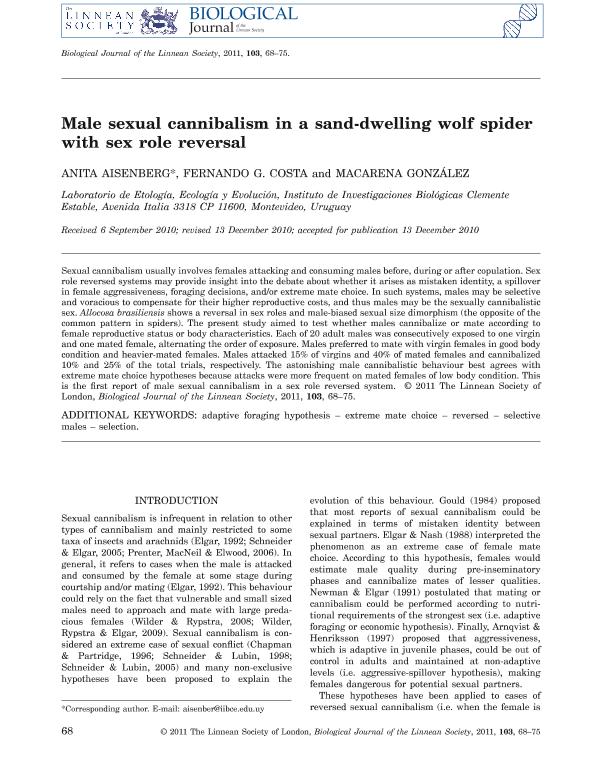Artículo
Male sexual cannibalism in a sand-dwelling wolf spider with sex role reversal
Fecha de publicación:
05/2011
Editorial:
Wiley Blackwell Publishing, Inc
Revista:
Biological Journal of The Linnean Society
ISSN:
0024-4066
e-ISSN:
1095-8312
Idioma:
Inglés
Tipo de recurso:
Artículo publicado
Clasificación temática:
Resumen
Sexual cannibalism usually involves females attacking and consuming males before, during or after copulation. Sex role reversed systems may provide insight into the debate about whether it arises as mistaken identity, a spillover in female aggressiveness, foraging decisions, and/or extreme mate choice. In such systems, males may be selective and voracious to compensate for their higher reproductive costs, and thus males may be the sexually cannibalistic sex. Allocosa brasiliensis shows a reversal in sex roles and male-biased sexual size dimorphism (the opposite of the common pattern in spiders). The present study aimed to test whether males cannibalize or mate according to female reproductive status or body characteristics. Each of 20 adult males was consecutively exposed to one virgin and one mated female, alternating the order of exposure. Males preferred to mate with virgin females in good body condition and heavier-mated females. Males attacked 15% of virgins and 40% of mated females and cannibalized 10% and 25% of the total trials, respectively. The astonishing male cannibalistic behaviour best agrees with extreme mate choice hypotheses because attacks were more frequent on mated females of low body condition. This is the first report of male sexual cannibalism in a sex role reversed system.
Archivos asociados
Licencia
Identificadores
Colecciones
Articulos(CCT - CORDOBA)
Articulos de CTRO.CIENTIFICO TECNOL.CONICET - CORDOBA
Articulos de CTRO.CIENTIFICO TECNOL.CONICET - CORDOBA
Citación
Aisenberg Olivera, Anita Diana; Costa, Fernando G.; González Pérez, María de la Macarena; Male sexual cannibalism in a sand-dwelling wolf spider with sex role reversal; Wiley Blackwell Publishing, Inc; Biological Journal of The Linnean Society; 103; 1; 5-2011; 68-75
Compartir
Altmétricas




